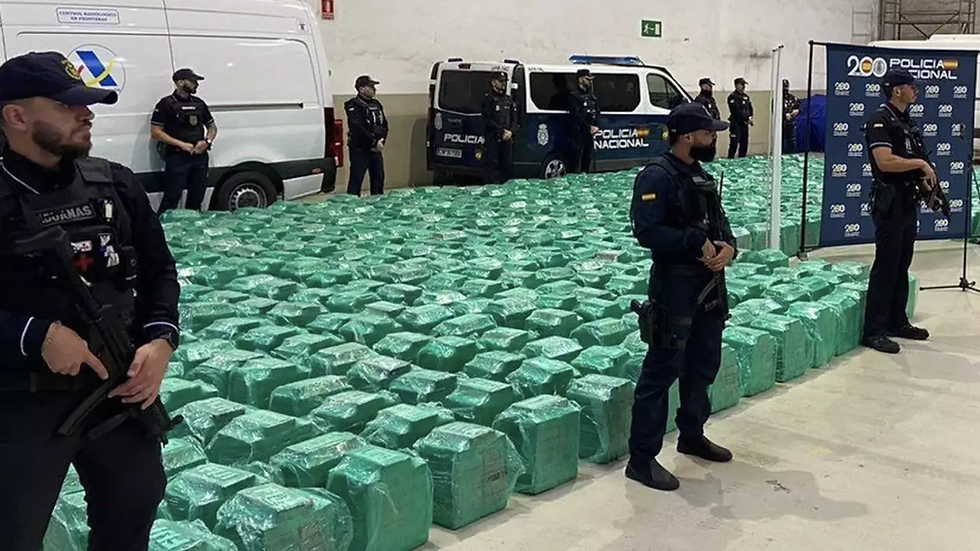Head of Spanish Fincrime Police Unit Arrested After €20 Million Drug Cash Discovered at Home
- Flexi Group
- Nov 11, 2024
- 4 min read
The head of Spain’s national police financial crime unit, Chief Inspector Óscar Sánchez Gil, was arrested this week after authorities discovered €20 million in drug money hidden within his residence. Sánchez, who leads the economic crimes division (UDEF), and his wife—also a police officer—are now in custody. Investigators reported that drug money was stashed in the walls of Sánchez’s home and even within his office. The couple now face multiple charges, including drug trafficking, bribery, money laundering, and dereliction of duty.

This high-profile arrest raises significant concerns about the impact of massive amounts of illicit funds circulating across Europe, where the continent has become the top global consumer of cocaine. As head of economic crimes, Sánchez was tasked with preventing money laundering and overseeing Suspicious Transaction Reports (STRs) from Spanish banks and fintechs. His position also involved handling sensitive intelligence from both Europol and Interpol, highlighting the gravity of his alleged misconduct.
“This is corruption on the greatest scale I have come across,” a source at Interpol told AML Intelligence. “It is a complete betrayal of his colleagues for financial gain. It has undermined confidence in the police on one hand; on the other hand it shows that officers will not stand for corruption in their ranks and will weed out bad apples wherever they are.”
Authorities will now investigate any sensitive information Sánchez may have provided to drug traffickers and whether he had any accomplices within the police or other agencies, the source added.
Sánchez, previously part of Spain’s drugs and organized crime unit, rose to head of economic crimes at Madrid’s Superior Police Headquarters. According to reports, he first came under suspicion roughly a year ago, prompting Internal Affairs to initiate surveillance on him. The arrest has reportedly stunned the national police, with Spanish newspaper ABC describing Sánchez as well-respected by his superiors and well-liked by colleagues. “It is true that he was a reserved person who spoke little, but nobody could have imagined anything like this,” the paper stated.
The investigation into Sánchez is linked to Spain’s largest cocaine seizure, a 13-tonne haul intercepted this week in Algeciras, a southern port city. Internal Affairs accelerated their probe following this seizure, leading to searches of five homes and offices in Madrid and Alicante. Local media reports that 100 vehicles, including high-end models such as Lamborghinis, were also seized.
Among those arrested and remanded in custody along with Sánchez and his wife are suspected drug traffickers and money launderers, according to El País. Prosecutors believe that the €20 million discovered at Sánchez’s home was likely the couple’s share from one or more drug trafficking operations. The investigation is ongoing, with additional arrests a possibility.
The case has intensified the alarm over the threats organized crime poses to public institutions across Europe, where authorities struggle with corruption among officials who turn a blind eye or sell sensitive information in exchange for bribes. In Benelux countries, officials report that public servants are often offered cash payments—up to €10,000—to assist traffickers. Belgium’s customs agency head recently reported that officers were being targeted by traffickers hoping to facilitate massive cocaine shipments through ports in Antwerp and Rotterdam. Belgium’s incinerators are now operating at full capacity to destroy seized drugs under extreme security measures to prevent theft by organized crime rings.
Reflecting on the arrest, Dutch prosecutor Janneke de Smet-Dierck noted, “These types of incidents not only put pressure on the integrity of individuals, but also on trust in international cooperation against financial crime. If we want to fight money laundering effectively, we need strong and transparent partnerships between countries. This news raises concerns about the risk of corruption within vital positions in our field. It also raises questions about how we can strengthen international cooperation and ensure that we not only combat the symptoms, but also tackle the root of the problem.”
The Internal Affairs raid on Sánchez’s Alcalá de Henares home led to the discovery of €20 million in cash hidden in the walls. Other reports indicate that an additional million euros, in €50 notes, was found in his police office. Sánchez’s wife, stationed at the National Police in Alcalá de Henares, joined him in a hearing at Spain’s National Court.
Sánchez’s career prior to UDEF leadership included work in the Narcotics section of Spain’s Drug and Organized Crime Unit, where he spearheaded high-profile cases such as the Titella operation targeting Spanish film producer José Luis Moreno. His downfall reportedly began several months ago, after suspicions emerged that he was passing information to drug traffickers. Internal Affairs eventually tapped his phone, gathering enough evidence for his arrest.
On November 6, National Police officers and Tax Agency Customs Surveillance officials intercepted a 13,062-kilo cocaine shipment in Algeciras—Spain’s largest drug haul to date and the second-largest in Europe. The container had been camouflaged with boxes of bananas in the front, concealing bricks of cocaine hidden further within. The investigation into Sánchez’s role in Spain’s complex criminal underworld continues as authorities work to uncover the full extent of his alleged corruption.
By fLEXI tEAM





Comments